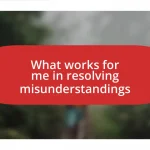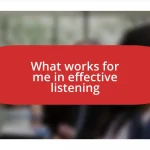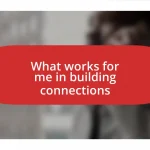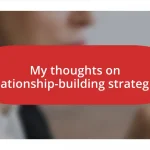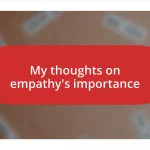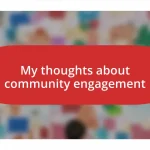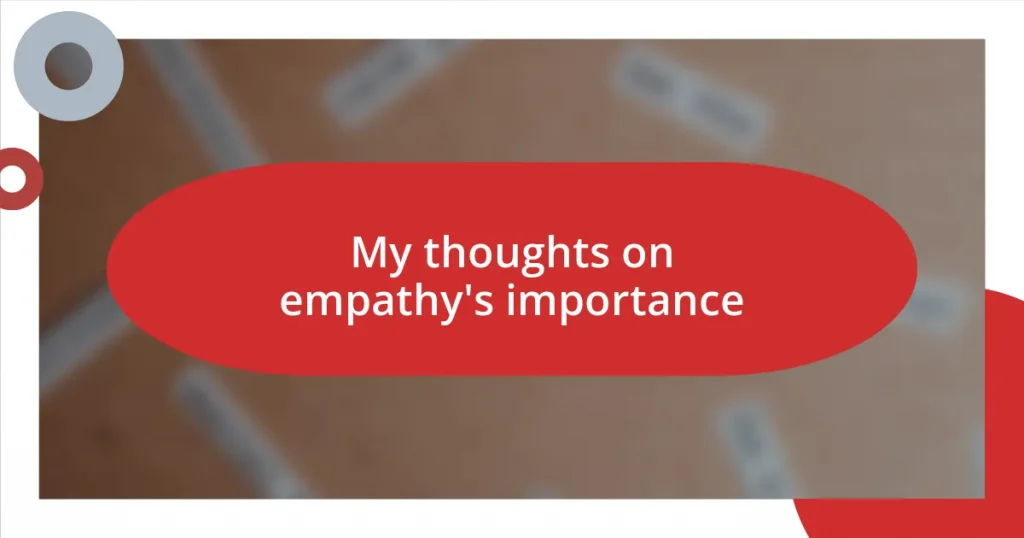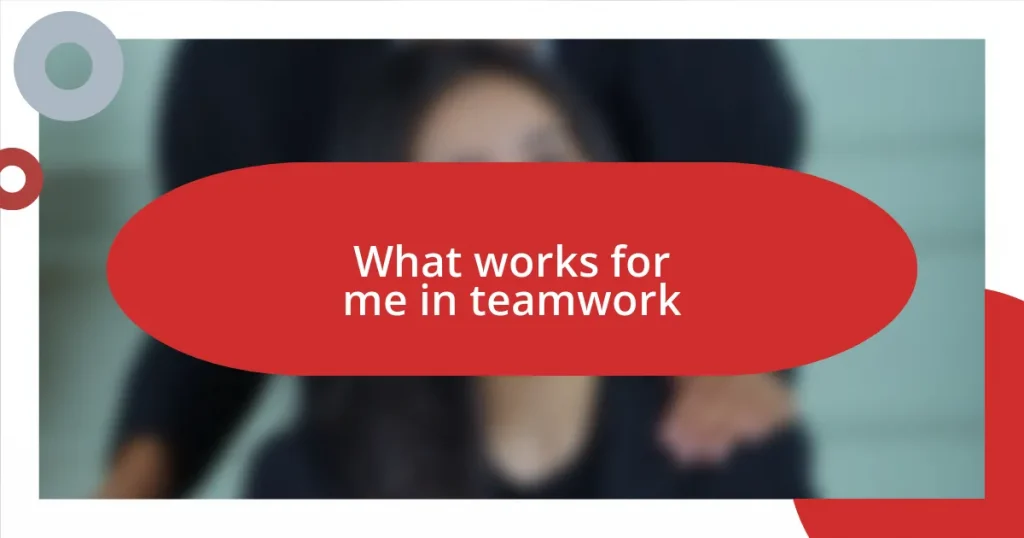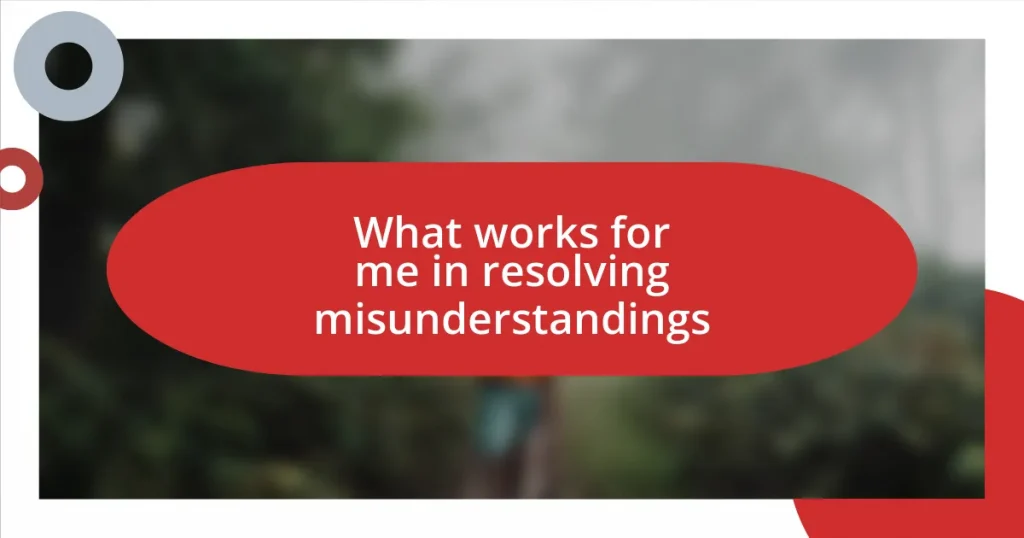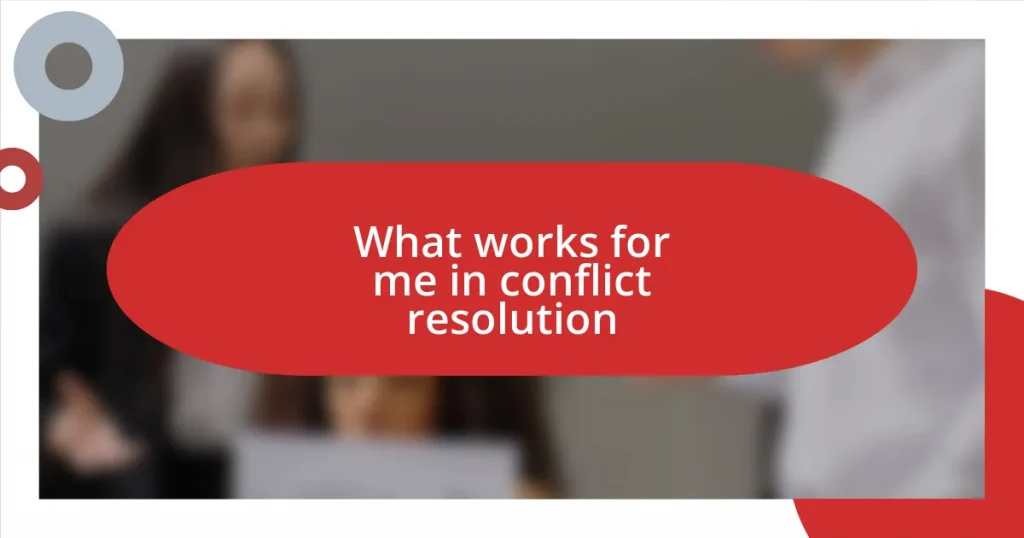Key takeaways:
- Empathy fosters deep connections and creates supportive environments, enhancing team dynamics and encouraging collaboration.
- Practicing active listening and understanding different perspectives can significantly improve communication and conflict resolution.
- Empathy leads to increased satisfaction in relationships by strengthening bonds, improving communication, and providing emotional support.
- Overcoming biases and emotional fatigue is essential for developing empathy and nurturing meaningful connections with others.
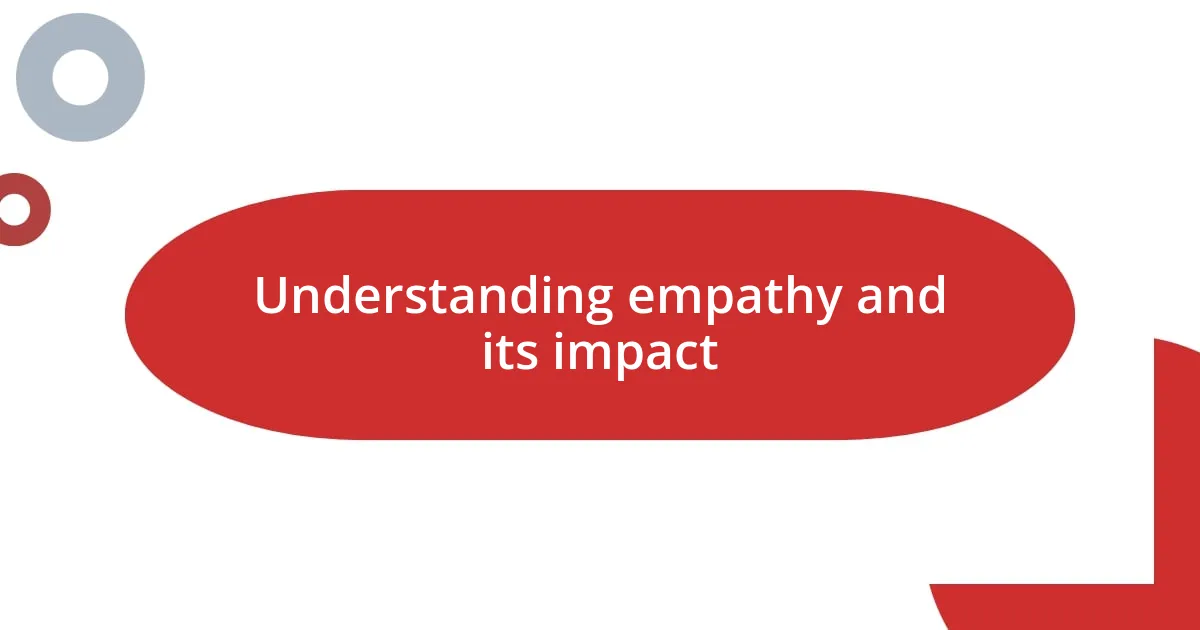
Understanding empathy and its impact
Empathy is more than just feeling for someone; it’s about truly connecting with their experiences. I remember a time when a close friend shared her struggles with anxiety. I tried to imagine what it was like for her, sitting in that overwhelming darkness. In that moment, I realized that my ability to empathize not only offered her comfort but also deepened our bond. Isn’t it fascinating how a simple act of understanding can create such profound connections?
When we practice empathy, we positively impact those around us, fostering a supportive environment. I often notice this at work; when a colleague faces a challenge and I take the time to listen, it transforms the atmosphere. Can you feel how such moments can dissolve tension and create unity? The collective sense of compassion ignites collaboration and sets the stage for creativity and trust.
The ripple effect of empathy extends beyond individual relationships. Team dynamics improve dramatically when empathy becomes a core value. Just the other day, I participated in a group discussion where everyone shared their viewpoints with openness. The respect and understanding we cultivated encouraged innovative ideas to flourish. How powerful it feels when people actually feel seen and heard, doesn’t it? This is the profound impact of empathy that can change lives and communities for the better.
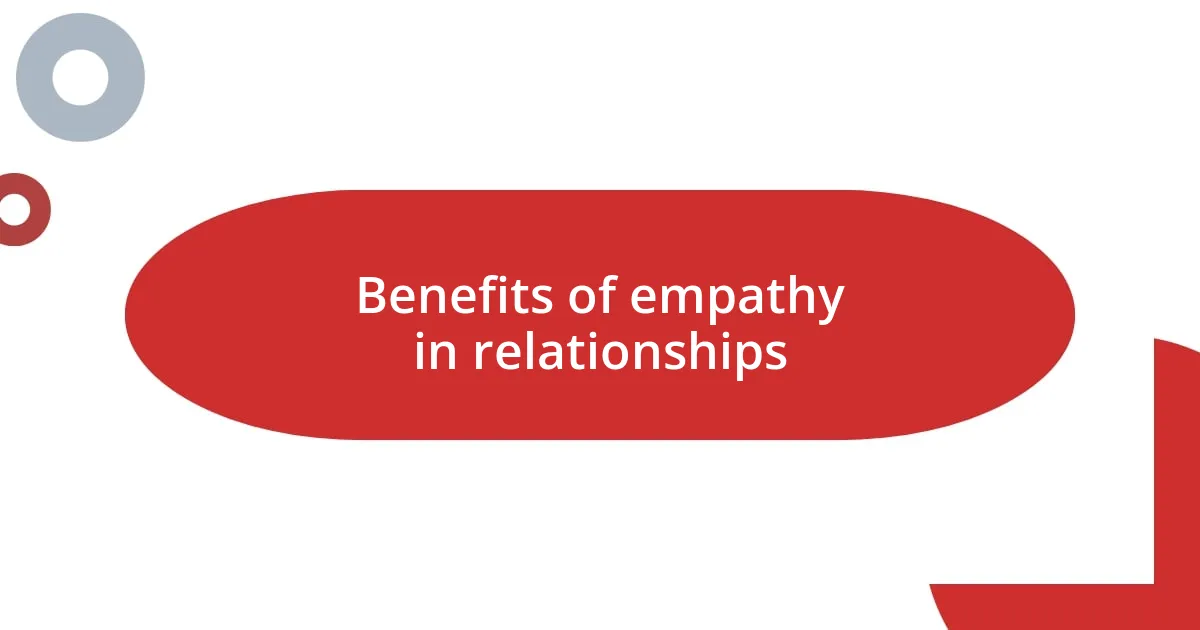
Benefits of empathy in relationships
When I think about the benefits of empathy in relationships, it’s clear that it fosters a deeper sense of connection. For instance, I recall a time when my partner was feeling overwhelmed with work stress. By simply listening and validating her feelings without jumping in to offer solutions, I saw her tension visibly ease. It’s a reminder that sometimes simply being present is the greatest gift we can give someone.
Empathy in relationships cultivates mutual respect and understanding, leading to greater satisfaction. Here are some benefits I’ve observed:
- Strengthened bonds: Shared vulnerabilities create intimacy.
- Improved communication: Open dialogue fosters trust and honesty.
- Conflict resolution: Understanding different perspectives helps find common ground.
- Emotional support: Being empathetic ensures everyone feels valued and understood.
- Increased happiness: Empathetic relationships often contribute to overall well-being and fulfillment.
These aspects highlight how empathy isn’t just about being compassionate—it’s about enhancing the quality of our connections.
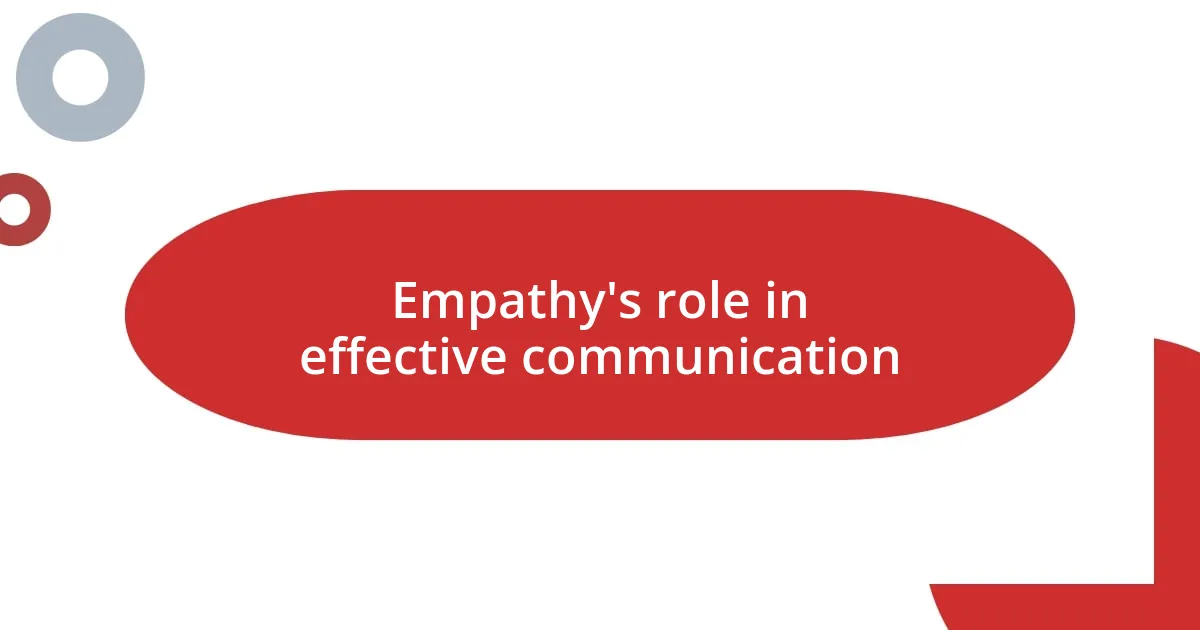
Empathy’s role in effective communication
Empathy is crucial for effective communication, as it allows us to genuinely grasp what others are feeling. I once had a disagreement with a co-worker during a critical project. Instead of arguing my point, I took a step back and asked how she felt about the situation. That simple act of listening brought clarity and helped us find a solution together. It struck me just how essential it is to approach conversations with a willingness to understand.
Moreover, empathy encourages open dialogue, making complex topics more approachable. I vividly remember facilitating a meeting where team members were hesitant to share their concerns. By openly acknowledging their feelings and inviting them to express themselves, we turned what could have been a tense session into a collaborative brainstorming experience. The shift in atmosphere was palpable, showing just how powerful empathetic communication can be in breaking down barriers.
Finally, at the heart of effective communication lies the ability to relate to one another. I often find that when I share my own experiences related to a topic, it creates a safe space for others to open up. It’s fascinating how vulnerability can spark deeper connections in conversations. This shared understanding fosters a richer dialogue that not only resolves conflicts but also encourages growth.
| With Empathy | Without Empathy |
|---|---|
| Encourages open dialogue | Creates misunderstandings |
| Strengthens connections | Causes emotional distance |
| Facilitates collaborative problem-solving | Results in conflict escalation |
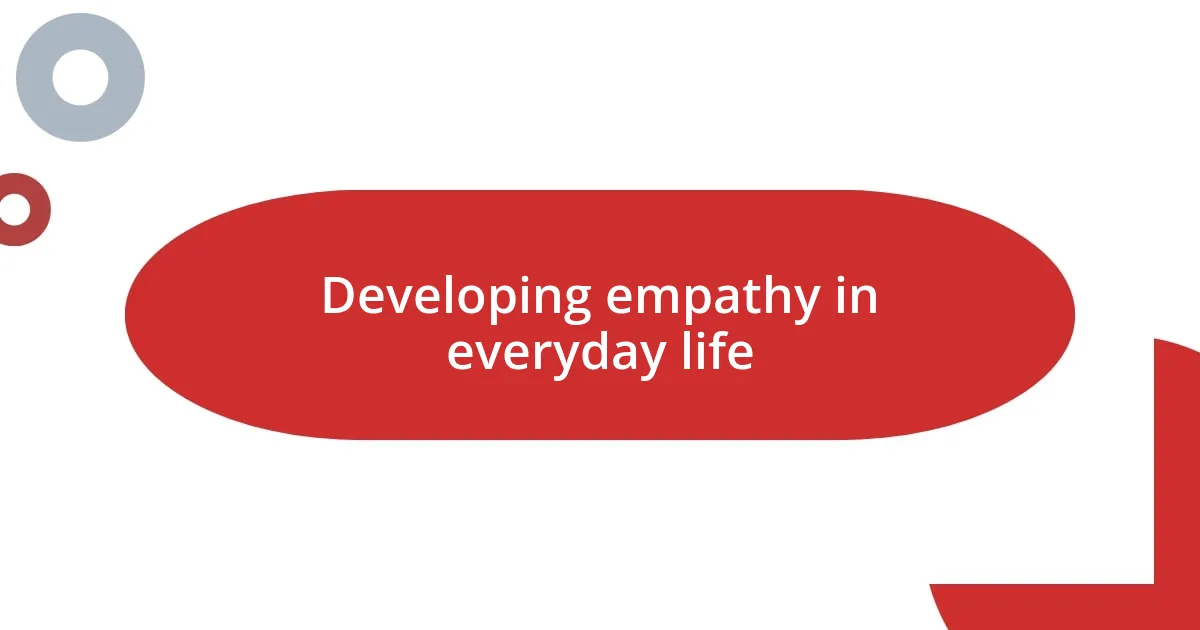
Developing empathy in everyday life
Developing empathy in everyday life is something I’ve actively worked on, and I’ve found it can start with small gestures. For instance, when I’m at the grocery store and see an overwhelmed parent juggling a toddler and a shopping list, I often offer a smile or a simple nod of understanding. Isn’t it interesting how a little acknowledgment can lighten someone’s load, even if just for a moment?
During conversations with friends, I consciously remind myself to listen more than I speak. I once had a coffee date where my friend shared his struggles with feeling disconnected at work. Instead of immediately offering advice, I really focused on understanding his perspective. It struck me how freeing it can be to simply be an empathetic ear. In those moments, I realize that empathy isn’t just a quality; it’s a practice that can enrich daily interactions.
I often challenge myself with this question: How can I see the world through someone else’s eyes today? This prompted me to volunteer at a local shelter recently. The stories I heard from folks there opened my heart and deepened my understanding of their realities. Each narrative became a reminder that empathy flourishes when we step outside our bubbles and truly engage with the world around us. It’s a humbling and transformative experience that can reshape how we relate to one another.
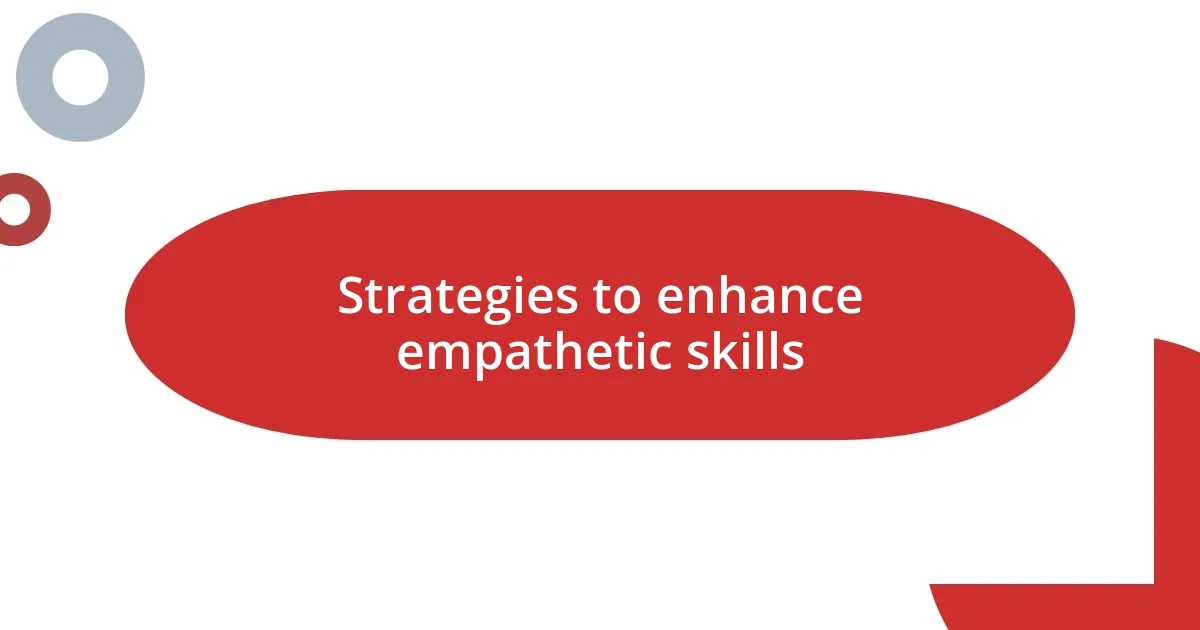
Strategies to enhance empathetic skills
One effective strategy to enhance empathetic skills is to practice active listening. I remember a time during a team project when a colleague seemed frustrated but didn’t directly express it. Instead of brushing over it, I paused and asked, “What’s on your mind?” It was incredible how that simple question opened up a deeper conversation. By truly focusing on what others say and reflecting back their feelings, we demonstrate our commitment to understanding them.
Another technique is to immerse ourselves in diverse experiences. For instance, I try to watch documentaries about different cultures or stories of those facing struggles in society. One film about refugees profoundly moved me; it allowed me to feel their journey through their eyes. Have you ever experienced a moment where media shifted your perspective? I believe these shared stories are vital. They push us to connect with emotions outside our own limited experiences, making empathy feel more tangible.
Lastly, journaling can be a powerful tool. I often write about my daily interactions and how I felt during those moments. Recently, I reflected on a frustrating encounter with a service worker who seemed overwhelmed. Writing it down helped me analyze my reaction and recognize that everyone has a story. Isn’t it fascinating how much clarity comes from putting our thoughts on paper? This practice not only cultivates self-awareness but also deepens our understanding of others’ feelings and challenges.
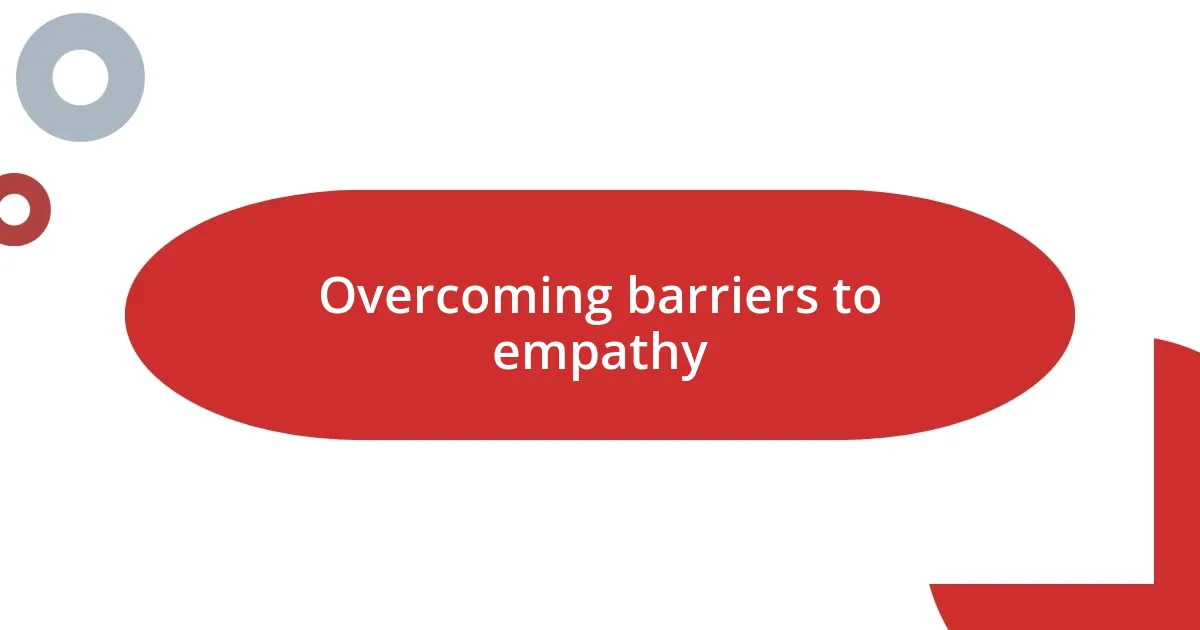
Overcoming barriers to empathy
I’ve noticed that one of the biggest barriers to empathy is our own biases and preconceived notions. For instance, there was a time when I assumed I understood the struggles of someone from a different background because I had faced challenges of my own. It wasn’t until I participated in a workshop focused on understanding racial and cultural differences that I realized how limited my perspective was. Have you ever caught yourself making judgments about someone before knowing their full story? Recognizing these biases is a critical first step in fostering true empathy.
Another hurdle often comes from emotional fatigue or becoming desensitized to the challenges others face. I experienced this once while reading about various social issues and feeling overwhelmed by the sheer volume of suffering in the world. I had to remind myself that it’s okay to take breaks and recharge emotionally. I began setting aside time for self-care practices, like meditation and nature walks, which enabled me to approach others’ stories with renewed energy and compassion. How do you recharge when the weight of others’ struggles feels heavy on your shoulders?
Lastly, effective communication can be a significant barrier to empathy. I recall a heated discussion with a close friend where we simply talked past each other. Instead of seeking to understand, we were caught up in defending our viewpoints. It wasn’t until I took a moment to ask her, “How did that make you feel?” that the conversation shifted. That simple change in approach opened the door for sharing and healing. Have you ever found that slowing down to ask questions has transformed your interactions? Not only does it build bridges of understanding, but it also encourages vulnerability, which is crucial for empathetic connections.

